
30 years of innovation – shaping the future of aviation IT
- Lufthansa Systems combines three decades of experience with forward-looking technology
- From cloud-based operations to AI-driven efficiency – Lufthansa Systems sets new standards in aviation IT
- The future of aviation IT is intelligent, connected, and automated

Raunheim, 7th August 2025. For 30 years, Lufthansa Systems has been at the forefront of aviation IT, driving digital transformation and enabling airlines to become smarter and more efficient. Founded in 1995 to elevate Lufthansa’s IT operations, the company quickly became a driving force in the digital evolution of the aviation sector. Today, its impressive product portfolio supports many critical airline business processes on the flight deck, in the cabin, and on the ground, serving more than 350 customers worldwide across all sizes and business models.
Lufthansa Systems continues to lead with cutting-edge technologies that address the most pressing challenges in aviation. They meet these requirements by utilizing advanced technologies and developing solutions designed to enhance airline operations’ predictability and efficiency.
The paperless flight deck is now a reality – and without Lufthansa Systems, who introduced digital navigation charts back in 2004, it wouldn’t be. Lido Flight 4D Integrated Flight Support (IFS) continues to optimize routes, enhancing efficiency while contributing to sustainability goals by reducing fuel consumption and CO₂ emissions. As the industry embraces new distribution models, Lufthansa Systems is setting new standards by redefining financial processes. SIRAX/ONE Order allows airlines to seamlessly integrate revenue accounting into an order-focused environment, simplifying financial management and enhancing transparency. The smart operations control assistant NetLine/Ops++ aiOCC uses reinforcement learning to enable real-time disruption management, helping airlines minimize delays and optimize resources. Another recent innovation generates profitable flight schedules from scratch or refines existing ones, allowing the airline to adapt to volatile market conditions and maximize network profitability swiftly.
“For 30 years, Lufthansa Systems has been shaping aviation IT with cutting-edge solutions. From AI-driven operational control to seamless financial processes and optimized flight planning, our technology has helped airlines to navigate a fast-changing industry. The future of aviation IT is intelligent, connected, and automated – and Lufthansa Systems is leading the way,” said Stefanie Neumann, CEO of Lufthansa Systems.
Cloud-based infrastructure and intelligent IT solutions drive the innovation strategy of Lufthansa Systems. By enabling optimized flight planning, digitalized processes, and scalable cloud solutions, airlines reduce their environmental footprint while ensuring operational flexibility. The Global Aviation Cloud offers a highly secure and scalable environment for mission-critical applications, built on partnerships with Google Cloud and Microsoft Azure. This multi-cloud approach enables seamless deployment across diverse airline systems, reducing environmental impact while enhancing operational flexibility.
As sustainability becomes a defining factor in aviation, smart IT solutions play a critical role – from AI-driven route optimization to digitalized workflows and cloud-based efficiencies that reduce hardware dependency.
“We need a holistic approach to aviation technology: The demand for integrated solutions is growing as airlines shift from solving isolated departmental challenges to enhancing cross-functional collaboration. Our iterative, agile approach to development is key to driving innovation and ensuring technology meets real-world needs faster and more effectively,” said Neumann. “AI still has its limitations, but its potential is vast – and the next decade will see it play an even more critical role in shaping the future of aviation. That’s why Lufthansa Systems is investing heavily in cloud-based solutions, AI-driven decision-making, and real-time operational control systems to drive this transformation.”
About Lufthansa Systems
Lufthansa Systems GmbH, the leading airline IT provider, has been shaping the future of digital aviation for 30 years. Helping airlines unlock their full potential, the company combines profound industry know-how with advanced technological expertise. A subsidiary of the Lufthansa Group, the company offers its more than 350 customers worldwide a portfolio with often market-leading products that cover all airline business processes – on the flight deck, in the cabin, and on the ground. Lufthansa Systems is committed to improving its own environmental footprint and that of its airline customers of all sizes and business models. Headquartered in Raunheim near Frankfurt/Main, Germany, Lufthansa Systems employs around 3,000 people at its locations in 16 countries.
www.LHsystems.com
Press Contact
Lufthansa Systems GmbH
Press Office
Mr. Ansgar Luebbehusen
Mrs. Ida Seibert
Tel.: +49 (0)69 696 90000
E-Mail: publicrelations@LHsystems.com
Am Messeplatz 1
65479 Raunheim
Registration: Amtsgericht Darmstadt, HRB 105392
Managing Director: Stefanie Neumann
ASAP Celebrates 30-year Anniversary!
This month, ASAP marks an incredible milestone — 30 years of serving our customers, growing with our industry, and evolving with purpose. We want to extend our deepest gratitude to every employee — past and present — whose hard work, dedication, and innovation have shaped our journey. You are the heartbeat of everything we do.
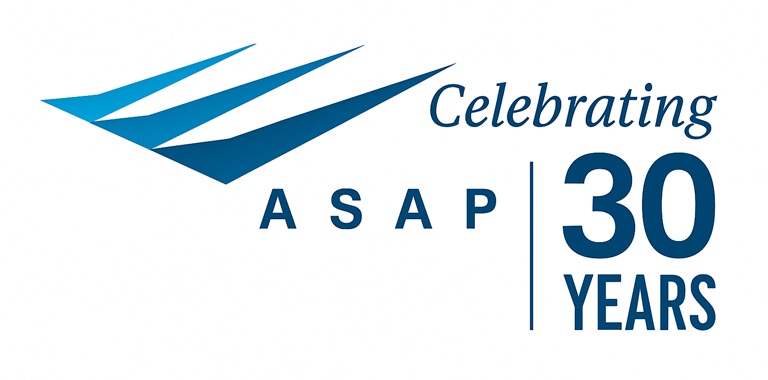
To our loyal customers and partners: thank you for trusting us, challenging us, and growing with us. Over the past 30 years, we have had the pleasure of providing performance data for over 300 different aircraft types to over 220 airlines from all around the world. Your support has fueled our commitment to continuous improvement and meaningful solutions.
Over the past three decades, we’ve witnessed—and embraced—immense change. With shifting technology, growing demands, and new challenges, we’ve stayed ahead by innovating relentlessly. Our flagship product, ASAP STAR, has transformed dramatically over the years—adapting to industry needs, integrating powerful new features, and helping over 220 airlines work smarter every step of the way.
Here’s to 30 years of resilience, relationships, and reinvention. And here’s to the future — we’re just getting started.
European Cargo choose EFOS Leave
We are incredibly pleased to announce that European Cargo have expanded their partnership with Evoke, selecting EFOS Leave to manage its aircrew vacation processes.

Following their adoption of EFOS Training last year, the decision to implement EFOS Leave reflects European Cargo’s commitment to employ proven technologies that increase operational efficiency and fairness for aircrew members.
EFOS Leave is a leading cloud-based vacation management platform, designed specifically for the aviation sector. It automates the handling of complex policies, contractual requirements, union rules, and bidding windows. By allocating leave requests with speed, accuracy, and transparency – it reduces manual effort while ensuring fair outcomes for all. EFOS Leave empowers crew with clarity and control over their time off, something that’s essential to ensure teams stay rested, focused, and ready to perform.
James Cartwright, Senior Commercial Manager at Evoke, commented: “We take great pride when an existing customer chooses to extend their use of our solutions. European Cargo’s selection of EFOS Leave is a strong endorsement of the system’s value and its ability to simplify the complexities of managing large-scale crew leave planning. We’re thrilled to continue supporting them as they strengthen and streamline their key processes to ensure they uphold operational readiness.”
Evoke is proud to support European Cargo in this next phase of their operational journey and remains committed to delivering smart digital solutions that make a tangible impact.
About European Cargo
European Cargo is the UK’s largest widebody cargo aircraft operator, operating Airbus A340-600F aircraft across a variety of scheduled programmes and charter flights. European Cargo has a fleet of 12 Airbus A340-600 aircraft with eight currently based at Bournemouth Airport.
Since 2022, European Cargo has been converting its aircraft to full freighters using a unique main deck cargo pod system. Four of the modified aircraft are currently operational. Six modified aircraft will be operational by October and ten aircraft by the end of 2025.
Each aircraft has a maximum payload of 76 tonnes with 440 cubic metre capacity across the upper and lower decks. The A340-600F is capable of non-stop flight over long distances, which along with its volumetric capacity, makes it extremely suitable for carrying e-commerce volumes from China to the UK.
About Evoke
Evoke Systems Limited has been delivering innovative cloud-based solutions to the aviation industry for over 20 years, specialising in crew training, leave management, shift handover and incident management, and document management. Serving airlines, cargo and low-cost carriers, private charters, and the wider aviation industry across the globe, Evoke helps to streamline and automate processes, improve workflows, and ensure compliance.
By supporting stretched departments with effective tools that leverage automation and powerful data insights, Evoke empowers teams to work safely, and with greater organisation and efficiency. Their proven platform, EFOS, enables users to stay informed, motivated, and operationally ready.
SkyUp Adopts Comply365’s Training Management System to Drive Compliance and Scalable Growth

Beloit, Wis. / Bristol, England / Kyiv Ukraine – 30 July, 2025 Comply365, LLC (“Comply365”), a leading global provider of operational content, training and safety management solutions powered by AI, for the global aviation industry, today announced its partnership with SkyUp, a dynamic Ukrainian Charter and low-cost carrier, to implement Comply365’s advanced Training Management System, Qualtero, to streamline and modernize its qualification training program. The partnership also covers a second AOC, SkyUp MT based in Malta.
SkyUp will benefit from a cutting-edge, modern training management solution trusted by leading airlines globally which ensures seamless compliance and effortless retrieval of training data to track regulatory and corporate audit needs. With Comply365’s market-leading Training Management System, the airline will implement Performance Evaluation, Training, Qualification Management, Courseware Delivery, and Reporting modules to standardize training, increase operational efficiency, and ensure consistent, compliant training experiences. SkyUp will also gain real-time visibility into training performance and qualifications while optimizing processes to drive sustainable growth.
“We are delighted to support SkyUp with modern, agile training management that will simplify performance evaluation and qualification tracking, ensuring employees stay qualified and compliant as the airline grows,” said Ilia Kostov, CEO of Comply365. “This collaboration marks another step forward as we continue to transform training and operational excellence across the global aviation industry – ensuring safety, compliance, and efficiency at every level.”
About Comply365
Comply365 is a leading provider of Operational Content Management, Safety Management and Training Management in the highly regulated industries of aviation, defense, rail and space. Comply365 provides a powerful combination of expertise and products underpinned by unified best practices, empowering its customers to elevate operational excellence, transform safety management and training management, with closer integration of relevant data sets across domains. Comply365 product portfolio ensures its customers’ crews and assets are always geared for peak operational performance, unlocking unparalleled financial and operational gains through more streamlined, robust and agile operations. Comply365 is the trusted technology partner of many of the most progressive aviation, defense, rail and aerospace organizations worldwide. For more information, please visit comply365.com.
FOR MORE INFORMATION CONTACT:
Kathrina Gallogly
Director of Marketing, Comply365
kathrina.gallogly@comply365.com
+44 7487 616 281
Porter Airlines Deploys Digital Winglets™ For Best-in-Class Fuel Savings, On-time Performance and Schedule Reliability
With Digital Winglets™ Porter saves 2-3 Percent of Fuel Per Optimized Flight and Improves On-time Performance Network-wide

Toronto, Canada, and Seattle, Washington, USA – July 30, 2025 – Porter Airlines, the fastest growing airline in Canada, and APiJET, the developer of the leading flight path optimization offering, Digital Winglets™, have announced the deployment of Digital Winglets™ across Porter Airlines’ North American fleet of Embraer E195-E2 aircraft.
Digital Winglets™ is a flight path optimization (FPO) solution that builds on NASA’s Traffic Aware Strategic Aircrew Requests (TASAR) technology. NASA’s TASAR, along with APiJET’s proprietary algorithms, mapping technologies and live aircraft state data solutions, enable air carriers worldwide to make deconflicted, route-specific flight optimization decisions to save fuel, improve schedule reliability and on-time performance, and reduce carbon emissions.
Porter Airlines operates the world’s largest fleet of Embraer E195-E2 aircraft, and the deployment of Digital Winglets™ will allow them to save 2-3% fuel and 1-2 minutes per optimized flight, while reducing delays network-wide.
“Digital Winglets™ provides a powerful suite of tools that allow us to optimize flights in real-time for the most fuel-efficient routing, which improves on-time performance and helps us deliver the elevated passenger experience that Porter is known for,” said Kent Woodside, executive vice president and COO at Porter Airlines. “The time and cost of introducing new technology across a fleet can be challenging. Deploying Digital Winglets™ was seamless, and APiJET provided a personal level of hands-on support throughout the process. Our continuing fleet expansion means that each new aircraft is seamlessly added to the platform immediately.”
“With Digital Winglets™, Porter can optimize to save fuel and reduce enroute time, improving schedule performance while achieving emissions reductions as well. Porter has a bold vision for expansion, and we are excited to work with them to further achieve their objectives for customer experience and efficiency,” said Rob Green, CEO of APiJET.
Digital Winglets™ is architected with a unique combination of online and ground-based technologies which allowed Porter to deploy it quickly and seamlessly into their fleet of 46 Embraer E195-E2 , with no hardware or software to install. As Porter continues its planned expansion of up to 100 Embraer E195-E2s, the benefits of Digital Winglets™ will be immediately available with no additional work.
About Porter
Since 2006, Porter Airlines has been elevating the experience of economy air travel for every passenger, providing genuine hospitality with style, care and charm. Porter’s fleet of Embraer E195-E2 and De Havilland Dash 8-400 aircraft serves a North American network from Eastern Canada. Headquartered in Toronto, Porter is an Official 4 Star Airline® in the World Airline Star Rating®. Visit www.flyporter.com or follow @porterairlines on Instagram, Facebook and Twitter.
About APiJET
Based in Seattle, WA, APiJET is the aviation software company behind Digital Winglets™, the flight route optimization solution that provides real-time, conflict-free, alternative flight paths. Digital Winglets™ continuously analyzes flight telemetry, including aircraft performance, wind, restricted airspace, convective weather, turbulence, and conflicting traffic, recommending real-time, conflict-free vertical and lateral rerouting. Digital Winglets™ reduces fuel burn and flight time, accelerating sustainability goals.
Contact:
Porter: media@flyporter.com
APiJET: press@apijet.com
India’s leading and longest-serving aviation services provider, Indamer Technics Goes Live with Ramco Aviation

Nagpur / Chennai, INDIA – July 30, 2025 – Global aviation software provider Ramco Systems announced the successful implementation of its Aviation Software at Indamer Technics Private Limited, a leading Indian aviation services company, designing and delivering technical, operational and financial solutions to enhance the efficiency and competitiveness of the Indian commercial aviation and government sectors.
With modules for Maintenance, Engineering, Supply Chain Management, Quality, Contract and Quote Management and Customer Billing and Finance, Ramco Aviation Software has replaced Indamer Technics legacy systems with a single integrated solution. Indamer Technics achieved go-live and adoption within 45 days, and has already begun realizing significant benefits, including enhanced inventory accuracy and visibility, effective tracking of open orders and project progress, improvement in billing TAT and accuracy, as well as streamlined material requirements planning and consumption.
Ashwani Acharya, Chief Operating Officer, Indamer Technics Private Limited, said, “In a fast-tracked rollout aligned with our business goals, we transitioned our MRO operations to Ramco Aviation Software. The system now powers every stage of our workflow, from contract execution to aircraft delivery. Thanks to the dedication and seamless collaboration between the teams at Indamer Technics and Ramco, we shall be able to deliver greater value, faster, to our customers.”
Sam Jacob, Executive Vice President & SBU Head – Aviation, Aerospace and Defense, Ramco Systems, said, “Realizing go-live status in just 45 days is a testament to the strength of our partnership with Indamer Technics and the robust capabilities built into Ramco Aviation Software, which embody the best-of-the-breed aviation MRO industry’s best practices. With this successful go-live, Indamer Technics now has a scalable, future-ready platform that will support their evolving needs and reinforce their position as a key player in India’s MRO sector for years to come. This is the level of transformation we strive to deliver for every organisation in the aviation MRO industry.”
Ramco Aviation Software is trusted by 24,000+ users to manage 4,000+ aircraft globally. With 70+ Aviation organizations onboard, Ramco is the solution of choice for top Airlines, 3rd party MROs, large Heli-Operators, leading Defense organizations, and major Urban Air Mobility companies around the world. Available on cloud, Ramco Aviation Suite provides accessibility with ‘Anywhere Apps’, significantly accelerating organizational efficiency and agility. Ramco is changing the paradigm of enterprise software with Artificial Intelligence based solutions, intelligent voice enabled user experience, and advanced features such as digital task cards, offline maintenance capability, conversational chatbots, HUBs and cognitive solutions.
About Indamer Technics:
Indamer Technics Private Limited is a key player in India’s Maintenance, Repair, and Overhaul (MRO) sector, specializing in the Airbus A320 family. Being strategically located in Nagpur it offers a comprehensive suite of MRO services, including Lease Return Checks, Heavy C-Checks, Structural Repairs, and Aircraft Painting. Besides Director General of Civil Aviation (DGCA) approval, the company holds approvals from Federal Aviation Administration (FAA), Civil Aviation Authority of the Philippines (CAAP), Civil Aviation Authority of the Cayman Islands (CAACI), and the Bailiwick of Guernsey.
Indamer Technics inherits a rich legacy from its parent company, Indamer Aviation founded in 1939 Indamer Aviation stands as a trusted name for last 85 years in the aviation industry. It is the oldest and largest players in maintenance of Fixed Wing and Rotary wing aircraft providing world-class maintenance solutions including CAMO services and a training academy (CAR147) for multiple aircraft variants. With an extensive presence across 17 stations and diversifying into, Fixed-Base Operator (FBO) offering premium FBO services at Delhi with an exclusive Indamer terminal featuring an executive lounge, business center, customs, and immigration facilities. Passengers and crew enjoy seamless services, including transfers in luxury vehicles, ensuring an effortless travel experience.
Trax expands JetBlue relationship with additional eMobility app and cloud hosting
Miami – Trax, a leading global provider of paperless aviation maintenance and engineering software products, announced the expansion of its agreement with JetBlue Airways to include an additional eMobility app and Trax’s cloud hosting solution. JetBlue’s adoption of supplementary Trax technologies is part of the company’s modernization vision to completely digitize the processes of its TechOps function.

JetBlue presently relies on Trax’s solutions to manage the airworthiness and regulatory compliance activities of its growing fleet of more than 280 aircraft. The addition of Trax solutions to JetBlue’s agreement demonstrates the ease of bundling Trax’s offerings to multiply customer benefit. Specifically, JetBlue’s introduction of Trax’s eMobility Planning Control app will enable JetBlue to streamline maintenance planning and scheduling, increasing technician efficiency and reducing risk of operational disruptions. This implementation also positions JetBlue for its planned future upgrade to further Trax solutions, including eMRO.
Trax’s cloud hosting is the company’s fastest-growing digital transformation solution. Hosting JetBlue’s services on Trax’s reliable and scalable infrastructure minimizes operational cost and enables JetBlue to focus on core business activities through effective resource allocation. Trax will provide 24/7 monitoring and support from its Miami and Chennai-based Hosting Operations Centers, utilizing a series of advanced dashboards to provide proactive performance management and real-time support.
“Trax is honored that JetBlue has chosen to develop their digital strategy around the Trax ecosystem today and in the future,” said Rajan Bindra, Trax’s Vice President of Business Development. “We are confident JetBlue’s adoption of additional Trax solutions will streamline their paperless approach and maximize maintenance planning efforts.”
“Moving to a fully digital ecosystem is a critical element of delivering reliable and caring service as part of our JetForward program. Trax’s Planning Control app and transition to the cloud from a hosted server environment not only accelerates aircraft planning and scheduling efficiencies, it allows easier and more rapid adoption of both internal and externally developed AI tools to deliver better service to our customers,” said David Marcontell, JetBlue’s Vice President – Technical Operations.
For more information on Trax’s solutions and hosting, please visit trax.aero.
About Trax
Trax is the premier provider of aviation maintenance mobile and cloud products in the global aviation market and a wholly-owned subsidiary of AAR CORP. (NYSE: AIR). Trax products support digital signatures, paperless working, including workpacks and manuals, RFID-capability for logistics, biometric security, offline capability for its suite of mobile apps, web-based applications, and the ability for users to work anywhere with easy access to real-time information. Through its eMRO and eMobility products, Trax provides comprehensive software solutions designed to manage all aspects of aircraft maintenance. Additional information can be found at trax.aero.
About JetBlue
JetBlue is New York’s Hometown Airline®, and a leading carrier in Boston, Fort Lauderdale-Hollywood, Los Angeles, Orlando and San Juan. JetBlue, known for its low fares and great service, carries customers to more than 100 destinations throughout the United States, Latin America, the Caribbean, Canada and Europe. For more information and the best fares, visit jetblue.com.
All Nippon Airways (ANA) selects the flight planning solution Lido Flight 4D from Lufthansa Systems
ANA invests in next-generation flight planning
- All Nippon Airways (ANA) selects the flight planning solution Lido Flight 4D from Lufthansa Systems to enhance its operational efficiency and reduce fuel costs
- The integrated setup includes the module for Integrated Flight Support (IFS) for real-time flight monitoring and optimized dispatcher workflows
- Lufthansa Systems collaborates with ANA to build pilot-driven replanning capabilities
Raunheim, 16th July 2025. All Nippon Airways (ANA), Japan’s largest airline and a 5-star carrier by Skytrax, has selected Lido Flight 4D, the most advanced flight planning solution from Lufthansa Systems, and has just started the implementation for ANA’s use. With this move, ANA reinforces its focus on stability in flight operations while enhancing cost efficiency through next-generation aviation IT.
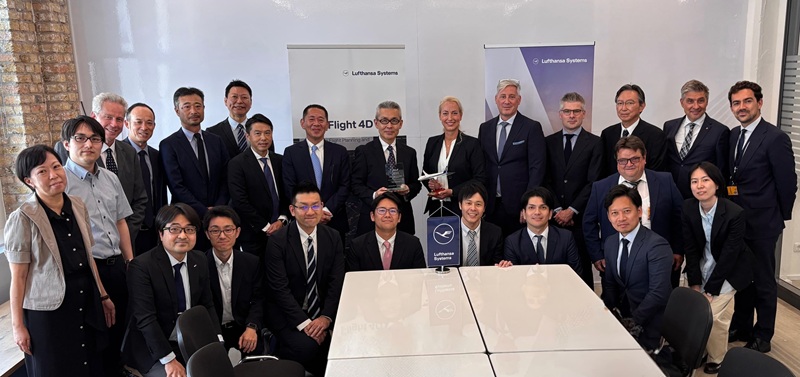
Lido Flight 4D supports superior route optimization, highly automated flight planning, and improved fuel efficiency by incorporating real-time data, such as airline-specific operational data, weather conditions, and airspace restrictions. Central to ANA’s implementation is the adoption of Lido Flight 4D Integrated Flight Support (IFS), which combines flight planning, monitoring, and in-flight support. The solution empowers ANA to elevate its flight management standards, ensuring unparalleled reliability and maintaining the highest safety standards across its global operations.
“We are proud to welcome ANA to the Lido family. As a flagship customer in Asia, their decision underscores our strong growth in the region and confirms the relevance of the solutions we offer for complex operational environments,” said Stefanie Neumann, CEO of Lufthansa Systems.
“Our Next-Generation Operations Concept is founded upon the impending digital transformation and AI integration. Even in its ongoing development phase at the time of our decision, Lido Flight 4D IFS demonstrated capabilities that were most aligned with our concept. Its cutting-edge automation, significant potential, and seamless integration into our operations made it the best-in-class choice to support our operational goals. Simultaneously, we recognize the challenge of transitioning our mindset from manual to data-driven automation. To achieve this strategic objective, we selected the most reliable system, a decision significantly influenced by the flexibility of the Lufthansa Systems team in supporting our specific operational workflows,” said Kazuto Shiba, Vice President, Operations Management Center at ANA.
Lufthansa Systems will collaborate with ANA to develop the capability for pilots to make adjustments to dispatcher-prepared flight plans, allowing the integration of the latest operational insights into the operational flight plan. The pilot planning interface enables changes to altitude, speed, and route options as part of ANA’s established briefing process.
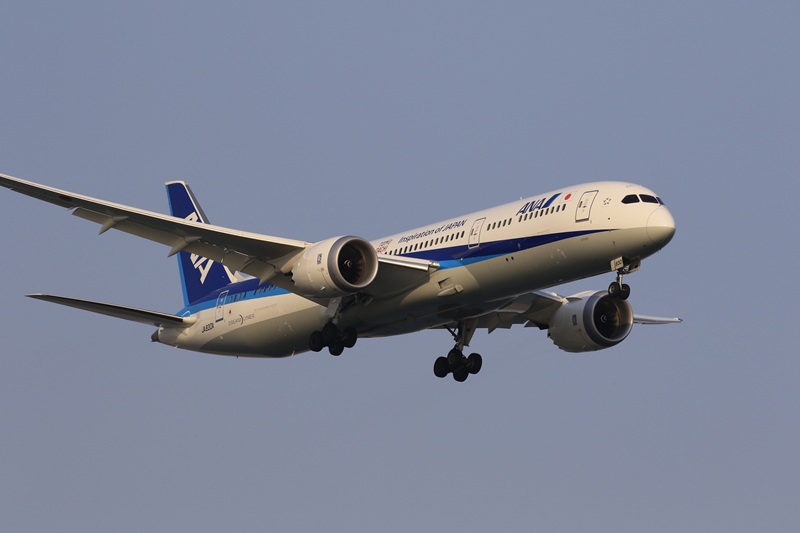
“With Lido Flight 4D IFS, we have introduced a new era of flight planning to the market. ANA’s commitment underlines the industry’s trust in the strategic direction we are taking. Our collaboration with ANA demonstrates our ability to deliver best-in-class flight management solutions while adapting to customer needs – laying the foundation for scalable innovations and operational efficiency,” said Philipp Barzen, Head of Lido at Lufthansa Systems.
The integration of Lido Flight 4D supports ANA’s strategy to remain at the forefront of innovation in aviation by providing measurable value through optimized flight routings, reduced environmental impact, and increased operational efficiency. This project also marks a strategic milestone for Lufthansa Systems, as ANA is the company’s first customer in Japan to implement Lido Flight 4D.
About All Nippon Airways
Founded in 1952 with just two helicopters, All Nippon Airways (ANA) has grown to become the largest airline in Japan. Today, ANA HOLDINGS Inc. (ANA HD) is recognized as one of the World’s Most Admired Companies by Fortune.
ANA HD was established in 2013 as the largest airline group holding company in Japan, comprising 71 companies. It offers three distinct airline brands: ANA, Peach, the leading LCC in Japan, and AirJapan, launched in 2024 for international routes covering Asia.
ANA’s legacy of superior service has earned SKYTRAX’s 5-Star rating every year since 2013, making it the only Japanese airline to win this prestigious designation for 12 consecutive years.
In 2025, ANA was honored with FlightGlobal’s Executive Leadership: Asia-Pacific Award for its visionary leadership and strategic growth.
ANA is also a four-time recipient of the ATW Airline of the Year award, recognized for excellence in aviation.
ANA HD has been selected as a member of the Dow Jones Sustainability World Index list for eight consecutive years and the Dow Jones Sustainability Asia Pacific Index list for nine consecutive years.
For more information about ANA and ANA HD, please visit: https://www.ana.co.jp/group/en/
About Lufthansa Systems
Lufthansa Systems GmbH, the leading airline IT provider, has been shaping the future of digital aviation for 30 years. Helping airlines unlock their full potential, the company combines profound industry know-how with advanced technological expertise. A subsidiary of the Lufthansa Group, the company offers its more than 350 customers worldwide a portfolio with often market-leading products that cover all airline business processes – on the flight deck, in the cabin, and on the ground. Lufthansa Systems is committed to improving its own environmental footprint and that of its airline customers of all sizes and business models. Headquartered in Raunheim near Frankfurt/Main, Germany, Lufthansa Systems employs around 3,000 people at its locations in 16 countries.
www.LHsystems.com
Press Contact
Lufthansa Systems GmbH
Press Office
Mr. Ansgar Luebbehusen
Mrs. Ida Seibert
Tel.: +49 (0)69 696 90000
E-Mail: publicrelations@LHsystems.com
flydocs and Air Astana announce long-term partnership to accelerate digital transformation
flydocs, the aviation global leader in digital records, asset management and digital engineering services, and Air Astana, Kazakhstan’s award-winning flag carrier, today announced their strategic partnership to digitise the records management process with flydocs’ market-leading Digital Records Management (DRM) solution across its fleet of over 60 aircraft.
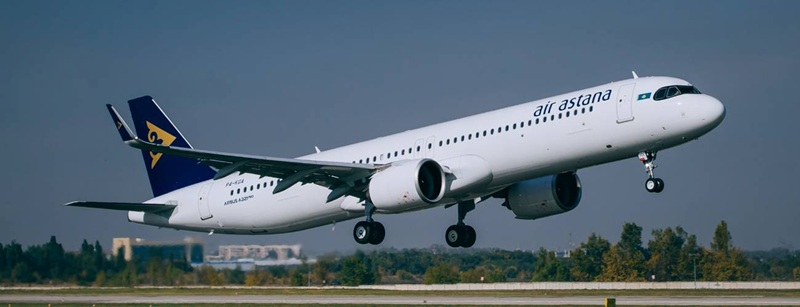
The collaboration brings together solutions from flydocs to create value out of aircraft maintenance data for Air Astana in the form of digital records management, ensuring smooth integration with their maintenance and engineering systems. Air Astana will experience first-hand benefits of flydocs’ software package, including the integration with their M&E system-TRAX.
Commenting on the partnership, Andy Smith, Chief Commercial Officer, flydocs said, “We are pleased to partner with Air Astana, as this collaboration marks a pivotal milestone in establishing our global footprint in Central Asia. With our core records management platform, we will fully support them in their digital transformation journey. Being selected as Air Astana’s preferred partner reinforces the tangible benefits of the flydocs DRM solution, which maximises asset value and enhances efficiency, compliance and operational excellence. We look forward to working closely with them to deliver innovative solutions and accelerate digital transformation.”
Pratap Shetty, Director IT Operations and Engineering Systems at Air Astana, said, “In our digital transformation journey of aligning technology with our business strategy, we’re excited to build on our existing commitment to excellence and customer-centric service with flydocs, a global leader in digital records and asset management. With their support of streamlined DRM software and holistic solutions, we look forward to digitising our aircraft maintenance records with improved data accuracy, real-time Information, and compliance management. As we continuously explore evolving technologies, this partnership is a testament to our ongoing commitment to enhancing passenger experience with improved operational efficiency and sustainable growth.”
About flydocs
flydocs is an asset management solution provider with the aviation industry’s most comprehensive solution for creating value out of aircraft maintenance data. We offer the tools and expertise that allow all industry stakeholders to drive sustainable innovation to help build the future of the commercial aviation asset lifecycle.
Recognised as a global leader in digital records management, flydocs was founded in 2007 and is 100% owned by Lufthansa Technik. With over 300 employees in multiple locations spread across the globe, flydocs is trusted by over 75 airlines, lessors, and MROs to deliver measurable long-term operational and cost efficiencies.
For more information please contact:
flydocs
Kshitija Sharma
Lead – Corporate Communication
Email: kshitija.sharma@flydocs.aero
Telephone: +91 704 331 7171
About Air Astana
Air Astana Group stands as the largest airline group in Central Asia and the Caucasus regions, distinguished by its impressive revenue and fleet size. This prominent aviation entity operates a substantial fleet of 61 aircraft, which are distributed between two main carriers: Air Astana and FlyArystan. Air Astana, the Group’s full-service airline, has been a cornerstone of regional air travel since it launched its inaugural flight in 2002. Over the years, Air Astana has built a reputation for providing premium services, catering to both business and leisure travelers with a commitment to safety, comfort, and efficiency. As one of the leading airlines in the region, Air Astana continues to serve a wide array of domestic and international routes, contributing significantly to the Group’s standing in the aviation industry.
The Air Astana Group operates an extensive network of scheduled, point-to-point, and transit flights, covering a wide range of destinations. These include short-haul and long-haul air travel and cargo services, extending across Central Asia, the Caucasus, the Far East, the Middle East, India, and Europe. This vast network allows the Group to provide seamless travel options to a diverse customer base, whether for leisure, business, or freight services. With its dual-carrier structure and broad route offerings, Air Astana Group continues to play a vital role in connecting key regions and contributing to the growth of the aviation sector in Central Asia and the Caucasus.
Air Astana
media@airastana.com
airastana.com
Air Astana and FlyArystan select StorkJet to provide comprehensive suite of fuel efficiency solutions
Air Astana, the flag carrier of Kazakhstan, and its low-cost subsidiary FlyArystan have selected StorkJet to provide a comprehensive suite of fuel efficiency solutions following a thorough evaluation process. These innovative, data-driven technologies will streamline flight operations to reduce the airline’s carbon footprint, lower operating costs, and support sustainable growth.
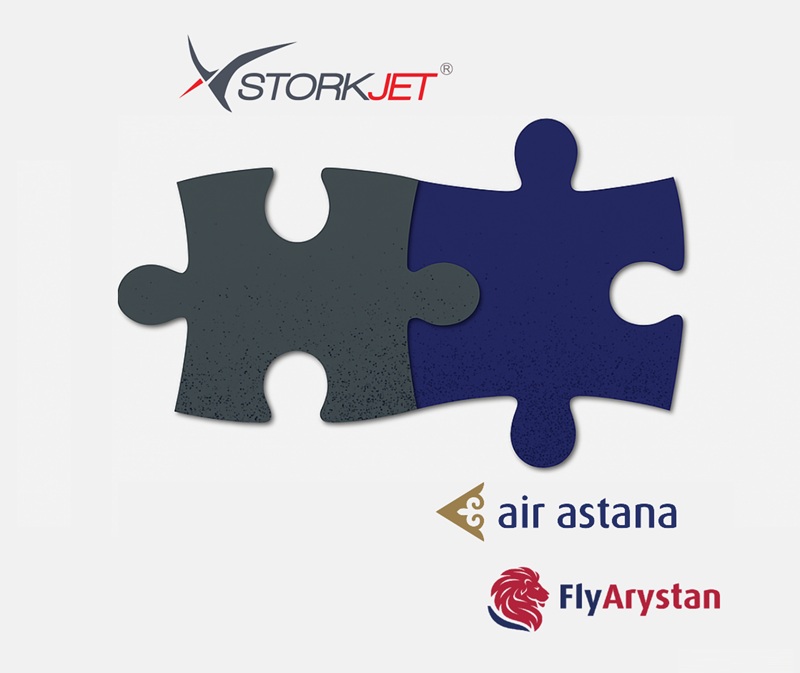
Air Astana has been a StorkJet customer since 2019, initially using the AdvancedAPM service. After experiencing firsthand the reliability and impact of StorkJet’s solutions, the airline decided to expand the partnership.
As part of the new agreement, AdvancedAPM will cover the entire fleet, delivering accurate, tail-specific performance factors. This will enable Air Astana to improve daily fuel planning, reduce overburns, lower fuel consumption, and enhance flight safety.
In addition, the airline will implement Idle Factor Optimization toimprove descent efficiency and energy management.
FuelPro, StorkJet’s web-based fuel efficiency dashboard, will track distinct fuel initiatives across all flight phases. Powered by tail-specific performance models, FuelPro supports teams such as Fuel Management, Flight Operations, and Dispatch by enabling analysis of historical flights, simulation of scenarios, and identify precise saving opportunities – leading to better decision-making and improved operational efficiency.
Pilot engagement remains a cornerstone of Air Astana’s fuel efficiency strategy. To support this, the airline is implementing FlyGuide – StorkJet’s EFB application designed by pilots, for pilots. FlyGuide offers targeted insights through pre-flight fuel briefings, in-flight support, and post-flight feedback, promoting continuous operational improvement.
FlyGuide FPO (Flight Path Optimization) EFB application provides full-flight optimization by providing flight-specific optimized speed and altitude profiles.
Air Astana will also implement StorkJet’s newest innovation: FuelPro Lab. Combining deep fuel analysis expertise with AI-powered Large Language Models, this advanced framework uses QAR data to generate custom parameters, models, visualizations, and complex analyses – delivering results in seconds.
“Air Astana is proud to partner with StorkJet as we expand our data-driven approach to fuel efficiency,” said Eoin O’Malley, Head of Operations Technical & Transformation at Air Astana. “By placing our pilots and dispatchers at the center of our fuel efficiency program, StorkJet’s tail-specific performance modeling, AI-powered analytics, and intuitive pilot EFB applications provide the necessary insights and tools needed to reduce our environmental footprint, while maintaining the highest standards of safety and operational performance.”
About Air Astana and FlyArystan
Air Astana Group is the largest airline group in Central Asia and the Caucasus regions by revenue and fleet size. The Group operates a fleet of 61 aircraft split between Air Astana, its full-service airline that operated its inaugural flight in 2002, and FlyArystan, its low-cost airline established in 2019. The Group provides scheduled, point-to-point and transit, short-haul and long-haul air travel and cargo on domestic, regional and international routes across Central Asia, the Caucasus, the Far East, the Middle East, India and Europe. Air Astana was recognised fourteen times in a row as the “Best Airline in Central Asia and CIS” at the Skytrax World Airline Awards and received a five-star rating in the major airline category by the Airline Passenger Experience Association (APEX). The Group is listed on the Kazakhstan Stock Exchange, Astana International Exchange and London Stock Exchange (ticker symbol: AIRA).
For more information, visit www.airastana.com and www.flyarystan.com.
About StorkJet
StorkJet specializes in SaaS (Software-as-a-Service) solutions and consulting services that help airlines enhance fuel efficiency and operational performance. By leveraging cutting-edge technologies such as Machine Learning, physics-based modeling, and big data analytics, StorkJet delivers advanced tools to drive measurable results with its comprehensive product portfolio, which consists of:
- AdvancedAPM, Aircraft Performance Monitoring for accurate fuel planning,
- FuelPro, which helps gain savings across 48 fuel initiatives from all flight phases
- FlyGuide, an EFB application for pilots, which helps them plan the flight in an optimum and informative way and gives intuitive feedback after the flight.
- The FlyGuide Flight Path Optimization (FPO) module provides pilots with optimum speeds and altitudes for climb, cruise, and descent, along with high-resolution weather data on the flight route.
It spans all fuel-efficiency domains and supports all aircraft types, offering unparalleled flexibility and making StorkJet your one-stop partner for fuel optimization.
